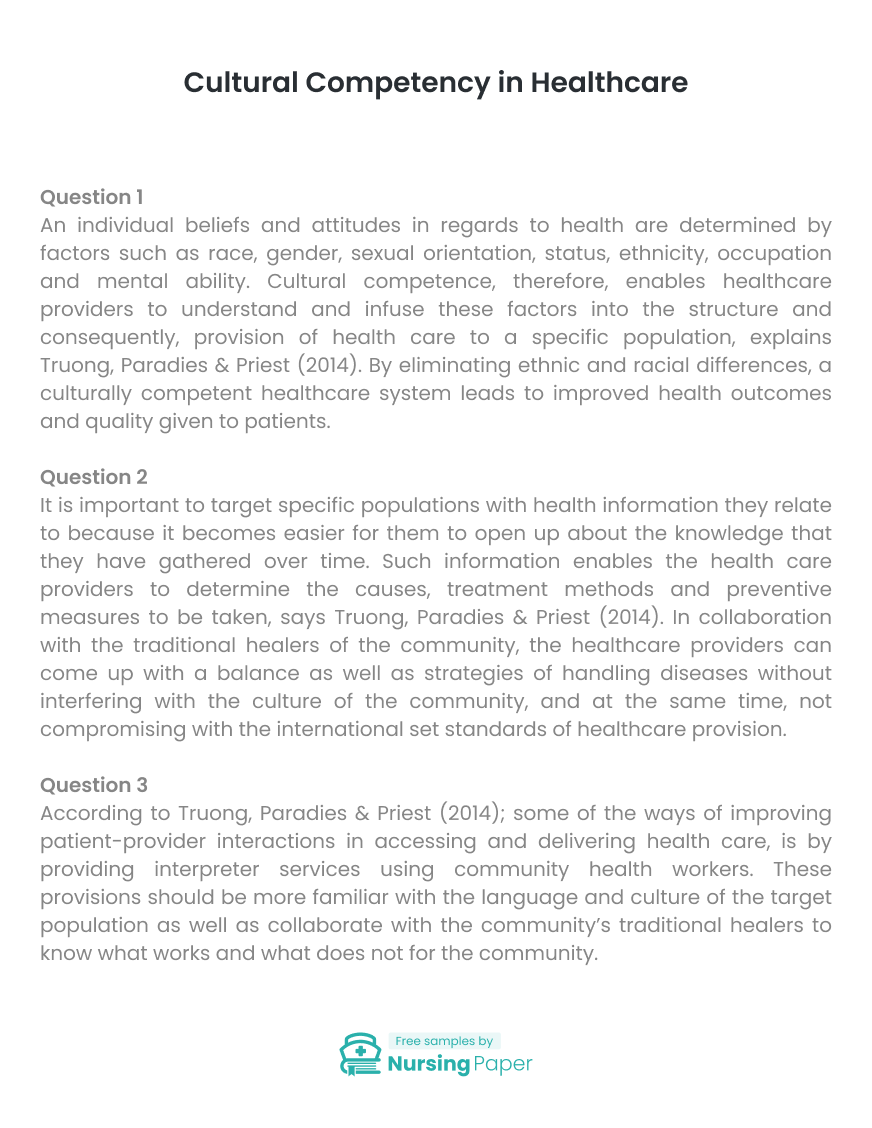
Cultural Competency in Healthcare
Question 1
An individual beliefs and attitudes in regards to health are determined by factors such as race, gender, sexual orientation, status, ethnicity, occupation and mental ability. Cultural competence, therefore, enables healthcare providers to understand and infuse these factors into the structure and consequently, provision of health care to a specific population, explains Truong, Paradies & Priest (2014). By eliminating ethnic and racial differences, a culturally competent healthcare system leads to improved health outcomes and quality given to patients.
Question 2
It is important to target specific populations with health information they relate to because it becomes easier for them to open up about the knowledge that they have gathered over time. Such information enables the health care providers to determine the causes, treatment methods and preventive measures to be taken, says Truong, Paradies & Priest (2014). In collaboration with the traditional healers of the community, the healthcare providers can come up with a balance as well as strategies of handling diseases without interfering with the culture of the community, and at the same time, not compromising with the international set standards of healthcare provision.


Question 3
According to Truong, Paradies & Priest (2014); some of the ways of improving patient-provider interactions in accessing and delivering health care, is by providing interpreter services using community health workers. These provisions should be more familiar with the language and culture of the target population as well as collaborate with the community’s traditional healers to know what works and what does not for the community. in regards to their beliefs, involving the community in community outreach and health-care decision-making helps to avoid the feeling of being left out. Another way is by increasing the hours of operation on not only the doctors and nurses but also the receptionists and other staff. And lastly, is ensuring that the placement of the health facility is easily accessible to everyone.
1. Truong, M., Paradies, Y., & Priest, N. (2014). Interventions to improve cultural competency in healthcare: a systematic review of reviews. BMC health services research, 14(1), 99.



The download will start shortly.

The download will start shortly.
 Subject:
Health and Social Care
Subject:
Health and Social Care  Number of pages: 4
Number of pages: 4  Subject:
Medicine
Subject:
Medicine  Number of pages: 13
Number of pages: 13  Subject:
Nursing
Subject:
Nursing  Number of pages: 5
Number of pages: 5  Subject:
Health and Social Care
Subject:
Health and Social Care  Number of pages: 9
Number of pages: 9  Subject:
Health and Social Care
Subject:
Health and Social Care  Number of pages: 8
Number of pages: 8  Subject:
Medicine
Subject:
Medicine  Number of pages: 5
Number of pages: 5  Subject:
Medicine
Subject:
Medicine  Number of pages: 6
Number of pages: 6  Subject:
Nursing
Subject:
Nursing  Number of pages: 9
Number of pages: 9  Subject:
Health and Social Care
Subject:
Health and Social Care  Number of pages: 2
Number of pages: 2  Subject:
Medicine
Subject:
Medicine  Number of pages: 4
Number of pages: 4  Subject:
Health and Social Care
Subject:
Health and Social Care  Number of pages: 2
Number of pages: 2  Subject:
Medicine
Subject:
Medicine  Number of pages: 3
Number of pages: 3  Subject:
Medicine
Subject:
Medicine  Number of pages: 46
Number of pages: 46  Subject:
Nursing
Subject:
Nursing  Number of pages: 4
Number of pages: 4  Subject:
Health and Social Care
Subject:
Health and Social Care  Number of pages: 2
Number of pages: 2 
